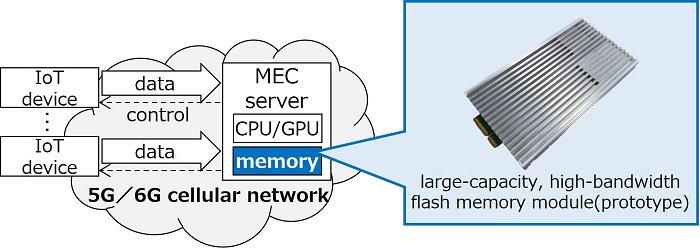Kioxia's High-Bandwidth Flash Module Prototype: Empowering Storage for the AI Era
With the rapid development of artificial intelligence technology, large-scale AI models are placing higher demands on storage devices. Traditional DRAM memory faces an intractable dilemma between capacity and bandwidth, failing to meet the needs of AI computing for rapid reading and writing of massive amounts of data. Moreover, in application scenarios such as the Internet of Things, big data analytics, and mobile edge computing (MEC) servers in the post-5G/6G era, there is an urgent need for a storage solution that combines large capacity with high bandwidth.
Technological Breakthroughs and Innovations
 Kioxia's high-bandwidth flash module prototype incorporates several cutting-edge technologies to achieve a leap in performance. First, the module adopts a daisy-chain topology, closely connecting the controller with NAND flash chips and linking them in a daisy-chain manner. This design effectively reduces signal crosstalk and avoids the complexity issues associated with traditional parallel bus architectures during high-speed transmission. Second, the introduction of PAM4 signal encoding mechanism upgrades data transmission from traditional binary to quaternary, enabling a single line to carry more information. Test results show that under this encoding mechanism, the bandwidth is doubled while power consumption is reduced. In addition, Kioxia has enhanced the transmission performance between the flash controller and the flash module, increasing their transmission rate to 4Gbps, further optimizing the data transmission efficiency of the entire storage system.
Kioxia's high-bandwidth flash module prototype incorporates several cutting-edge technologies to achieve a leap in performance. First, the module adopts a daisy-chain topology, closely connecting the controller with NAND flash chips and linking them in a daisy-chain manner. This design effectively reduces signal crosstalk and avoids the complexity issues associated with traditional parallel bus architectures during high-speed transmission. Second, the introduction of PAM4 signal encoding mechanism upgrades data transmission from traditional binary to quaternary, enabling a single line to carry more information. Test results show that under this encoding mechanism, the bandwidth is doubled while power consumption is reduced. In addition, Kioxia has enhanced the transmission performance between the flash controller and the flash module, increasing their transmission rate to 4Gbps, further optimizing the data transmission efficiency of the entire storage system.
Performance and Advantages
The high-bandwidth flash module prototype boasts a massive capacity of 5TB and a transmission speed as high as 64GB/s. This speed is more than four times faster than the fastest PCIe 5.0 drives currently on the market, approaching the throughput of HBM2E per stack. In terms of power consumption control, the module performs excellently, with power consumption below 40W. Compared with traditional high-performance storage devices, its energy efficiency is significantly improved. For hyperscale data centers and AI data centers, this low-power storage device can effectively reduce operating costs. In terms of system scalability, thanks to the daisy-chain connected controllers, adding more modules does not consume additional bandwidth, and performance can be linearly scaled with capacity. A complete set of 16 modules can achieve a flash capacity of 80TB and a throughput of over 1TB/s, something that was previously only possible with parallel file systems or DRAM caches.
Application Prospects and Outlook
Kioxia's high-bandwidth flash module prototype can be widely applied in fields such as the Internet of Things, big data analytics, and high-end AI processing. Particularly in mobile edge computing (MEC) servers in the post-5G/6G era, it is expected to significantly drive the digital transformation process. In addition, Kioxia will also focus on emerging trends such as generative AI, promoting the early commercialization of this technology. In the future, as the technology is further refined and costs are reduced, this high-bandwidth flash module is expected to be widely used in more fields, bringing new changes to data storage and processing.
Conevo Semiconductor Chip Distributor
Conevo is a leading distributor specializing in high-quality integrated circuit (IC) chips, offering a comprehensive range of electronic components, including amplifiers, FPGAs, microcontrollers, and other chips. With a focus on reliability and innovation, Conevo provides solutions tailored to meet the diverse needs of modern electronics. Here are some popular IC models:
● TDA7576B: A high-performance audio amplifier IC, ideal for automotive and home audio systems, delivering clear and powerful sound with minimal distortion.
● TMS5700714APGEQQ1: A robust microcontroller designed for automotive applications, offering high reliability and advanced safety features, making it suitable for critical control systems.
● XC7K325T-2FFG900I: A high-density FPGA with extensive I/O capabilities, perfect for complex digital designs, providing flexibility and high performance for a variety of applications.
Website: www.conevoelec.com
Email: info@conevoelec.com








